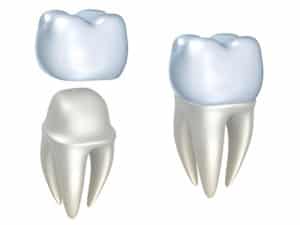
Crowns can also be used to hold together different parts of broken teeth or tooth. On top of that, it can also be used to hold the bridge in place or to improve one’s appearance by placing them on discolored teeth or to cover misshapen.
Taking Care of a Dental Crown
After having a crown placed, you should not feel any sensitivity or discomfort. If a root canal was not done on your tooth, then you might experience some sensitivity to cold meals or drinks. Ensure that you contact us in case you begin to experience any pain.
Many at times, the pain that you may experience when biting down on meals means typically that your crown is too high. While a crown is normally protected from decay, we will recommend a fluoride gel that you will use every night before you sleep.
On top of that, a crown will not protect you from gum diseases. Thus, you should ensure that you brush your teeth at least twice a day and floss as well. You should be aware that all-porcelain crowns can chip. Thus, if your crown chips, then give us a visit as soon as possible. We will etch the porcelain used to make the crown with a particular agent before bonding with a composite resin which will fix the chipping.
There are instances when your crown will fall out. If this happens, then you should place your crown in a zipped bag and then bring it to our practice. On many occasions, a new crown will be required. Thus we can use your old crown as a non-permanent crown.
